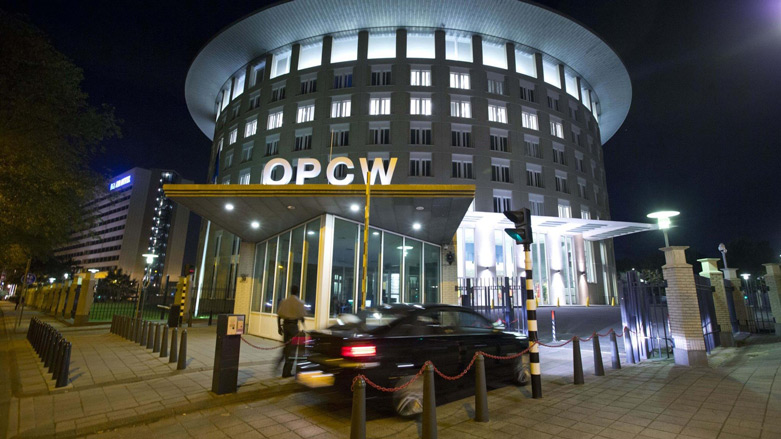OPCW to investigate responsibility for chemical attacks, commemorates anniversary of Iraqi attack on Sardasht

WASHINGTON DC (Kurdistan24) – The member states of the Organization for the Prohibition of Chemical Weapons (OPCW), responsible for investigating the use of chemical weapons, voted on Wednesday to give the OPCW additional powers, aimed at holding accountable those who might use such weapons.
Led by Britain, they approved a new, additional mission for the OPCW: determining responsibility for the use of banned chemical weapons. Until now, the OPCW was charged with determining if such weapons had been employed, but not which party had used them.
In recent years, the regime of Bashar al-Assad has been the party most frequently using banned chemical weapons. When investigating reports of such weapons in Syria, the OPCW’s mission was to determine if they had been used, but not who was responsible.
Following an OPCW finding that chemical weapons’ use had occurred in Syria, the regime and its Russian ally typically charged that it had been the work of Syrian rebels.
In the 1980s, Saddam Hussein was the most notorious user of chemical weapons. On Thursday, the OPCW marked the 31st anniversary of the chemical attack on Sardasht in Iranian Kurdistan, in which Iraqi planes dropped mustard gas on residential areas of the town.
“Every year on 28 June, we come together to mourn the men and women who perished and those who continue to suffer the terrible after-effects of the chemical attack on the Iranian town of Sardasht,” the OPCW said.
On March 16, the OPCW issued a statement marking “the horrendous crime against humanity that befell thousands of citizens of Halabja” in 1988, in Iraqi Kurdistan—“men, women and children alike.”
Wednesday’s 82-24 vote approving the OPCW’s new mission was driven by Britain’s concern about the use of a sophisticated poison in an attempt to kill the former Russian military intelligence officer, Sergei Skripal.
Skripal, who became a double-agent for Britain in the 1990s, was arrested by Russian authorities in 2004 and released six years later in a spy swap.
In March, Skripal was discovered, along with his daughter who was visiting from Russia, comatose on a park bench in the quiet, cathedral town of Salisbury, where he had settled.
British authorities determined that a very small amount of Novichok nerve agent had been smeared on the door handle of his house, seriously injuring the father and daughter. It was first assumed that the agent would prove fatal, but doctors were able to save them both.
The attempt to poison Skripal was the first use of chemical weapons on European soil since World War II. Britain charged that Moscow was responsible, but the Russians denied that.
Wednesday’s vote split along political lines. Britain, the US, and their allies voted to give the OPCW the authority to determine responsibility for the use of chemical weapons. Russia and its allies—including Syria, Iran, Belarus, Kazakhstan, and Venezuela—voted against the measure.
The decision condemned “in the strongest possible terms the use of chemical weapons by anyone under any circumstances,’ while it called on the OPCW Secretariat to develop arrangements “to identify the perpetrators of the use of chemical weapons in the Syrian Arab Republic.”
The decision also affirmed more generally that whenever chemical weapons are used, “those who were the perpetrators, organisers, sponsors or otherwise involved should be identified.”
Russia strongly denounced the decision, as its Deputy Foreign Minister Sergei Ryabkov affirmed on Thursday, “We do not consider the work of the so-called attributive mechanism to be legitimate.”
